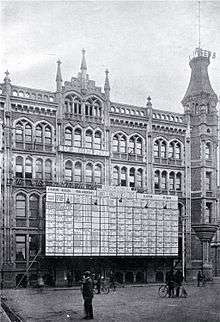New Zealand general election, 1919
| | |||||||||||||||||||||||||||||||||||||||||||||||||||||||||||||||||||
| |||||||||||||||||||||||||||||||||||||||||||||||||||||||||||||||||||
| |||||||||||||||||||||||||||||||||||||||||||||||||||||||||||||||||||
| |||||||||||||||||||||||||||||||||||||||||||||||||||||||||||||||||||
The New Zealand general election of 1919 was held on Tuesday, 16 December in the Māori electorates, and on Wednesday, 17 December in the general electorates to elect a total of 80 MPs to the 20th session of the New Zealand Parliament. A total number of 560,673 (80.5%) voters turned out to vote.[1]
In 1919 women won the right to be elected to the House of Representatives. The law was changed late in 1919, and with only three weeks notice, three women stood for Parliament in 1919.
They were Ellen Melville in Grey Lynn, Rosetta Baume in Parnell, and Mrs Aileen Cooke in Thames. Ellen Melville stood for the Reform Party and came second. She stood for Parliament several more times, but while generally polling well she never won a seat.
Results
Though Labour Party captured only eight seats it received a quarter of the votes – a shock to conservative minds due to Labour being founded only three years earlier in 1916. [2]
Party totals
| Election results | |||||
|---|---|---|---|---|---|
| Party | Candidates | Total votes | Percentage | Seats won | |
| Reform Party | 67 | 197,041 | 35.63 | 45 | |
| Liberal Party[nb 1] | 66 | 166,675 | 30.14 | 19 | |
| Labour Party | 59 | 134,094 | 24.25 | 8 | |
| Independents[nb 2] | 39 | 55,161 | 9.98 | 8 | |
| Total valid votes | 552,971 | 80 | |||
| Informal votes | 7,702 | 1.37 | |||
| Registered voters | 683,420 | ||||
- ↑ Includes one MP returned unopposed, and one Independent Liberal
- ↑ Includes ex-members of the three main parties as well as long-standing Independents
Votes summary
Electorate results

The table below shows the results of the 1919 general election:
Key
| Reform | Liberal | Labour | Liberal-Labour | |||||
| Independent Liberal | Independent Labour | Independent | ||||||
Summary of changes
A boundary redistribution resulted in the abolition of four electorates:[14]
- Grey, held by Harry Holland
- Otago Central, held by Robert Scott
- Selwyn, held by William Dickie
- Taumarunui, held by William Thomas Jennings
- Wellington Suburbs and Country, held by Robert Alexander Wright
At the same time, four new electorates were created:[15][16]
- Manawatu, previously abolished in 1911
- Roskill, first created through the 1918 electoral redistribution
- Rotorua, first created through the 1918 electoral redistribution
- Waitomo, first created through the 1918 electoral redistribution
- Wellington Suburbs, previously abolished in 1911
Notes
- ↑ "General elections 1853-2005 - dates & turnout". Elections New Zealand. Retrieved 12 January 2011.
- ↑ Lipson 2011, p. 211.
- ↑ Hislop, J. (1921). The General Election, 1919. National Library. pp. 1–6. Retrieved 6 December 2014.
- 1 2 3 4 Gustafson 1980, p. 181.
- ↑ Gustafson 1980, p. 155.
- ↑ "Notice of Nominations Received". Hawke's Bay Tribune. IX (303). 9 December 1919. p. 6. Retrieved 16 October 2015.
- ↑ "Napier". Hawera & Normanby Star. LXXIV. 7 November 1919. p. 5. Retrieved 16 October 2015.
- ↑ Brown, Colin. "Moses Ayrton". Dictionary of New Zealand Biography. Ministry for Culture and Heritage. Retrieved 28 December 2013.
- ↑ Gustafson 1980, p. 154.
- ↑ "Notice of Nominations Received". The Press. LV (16702). 10 December 1919. p. 12. Retrieved 20 December 2014.
- ↑ "Rotorua Seat". Auckland Star. L (282). 27 November 1919. p. 11. Retrieved 12 December 2014.
- ↑ "Liberal Selection for Tauranga". Wairarapa Daily Times. 45 (13977). 11 November 1919. p. 5. Retrieved 7 December 2014.
- ↑ "Waitemata Parliamentary Election". Observer. XL (14). 6 December 1919. p. 12. Retrieved 5 December 2014.
- ↑ McRobie 1989, pp. 75–80.
- ↑ Wilson 1985, pp. 266–276.
- ↑ McRobie 1989, pp. 79f.
References
- Gustafson, Barry (1980). Labour's path to political independence: The Origins and Establishment of the New Zealand Labour Party, 1900–19. Auckland, New Zealand: Auckland University Press. ISBN 0-19-647986-X.
- Lipson, Leslie (2011) [1948]. The Politics of Equality: New Zealand’s Adventures in Democracy. Wellington: Victoria University Press. ISBN 978-0-86473-646-8.
- McRobie, Alan (1989). Electoral Atlas of New Zealand. Wellington: GP Books. ISBN 0-477-01384-8.
- Wilson, James Oakley (1985) [First published in 1913]. New Zealand Parliamentary Record, 1840–1984 (4th ed.). Wellington: V.R. Ward, Govt. Printer. OCLC 154283103.


.jpg)